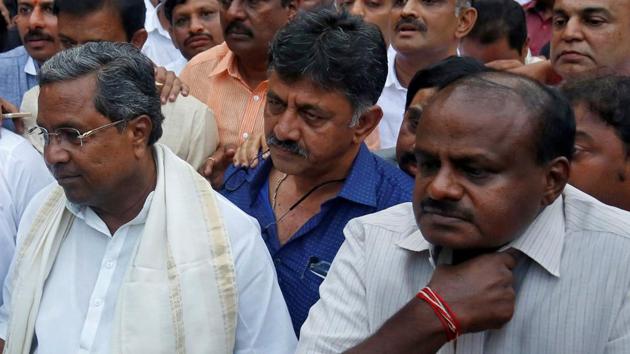Karnataka results showed the importance of strategic voting in Indian elections
Post the results, the strategic alliance between the JD(S) and the BJP ceased to exist. However, the fact that the main enemy on the ground for the JD(S) is the Congress, and not the BJP, could well change strategic considerations once again in the not-too-distant future
The alacrity with which the JD(S) and the Congress got together to stake a claim to form the government in Karnataka may well have surprised the BJP. But the coalition has had no luck so far. At the moment, the BJP seems to have the upper hand. It is not just that the Congress has been slow to react in recent state elections, but there is also sufficient reason to believe that the JD(S) had made common ground with the BJP during the campaign. The success of this strategic alliance contributed in no small way to the Congress being trounced, losing well over a third of its seats, despite seeing an increase in its vote share from the previous assembly elections.

The most obvious cases of the strategic alliance were in constituencies in which the three-party race was converted into a straight fight against the Congress. This may have been easier in some regions in which the JD(S) did not have a presence, as in the coastal districts which saw a straight fight between the Congress and the BJP. The intensity of this conflict may have been enhanced by communal polarisation. But this is only a part of the picture. The region has been communally polarised for decades, and one of only three Congress successes in the region was a Muslim candidate in Mangalore, a constituency where Muslims are far from being a majority. A more likely influence on the shift to the BJP in coastal Karnataka is the fact that the region is seeing a massive movement out of agriculture. The BJP abandoned its traditional support among the agriculturalists, including the Bilavas who had benefitted from land reforms, and supported castes that had pioneered the movement out of agriculture. The new candidates the BJP put up were not as well known as the stalwarts the Congress chose, but they represented a change in the region and won.
The reduction of three-party contests to straight fights was more strategic in the old Mysore region of southern Karnataka. The narrative in this region was marked by a consolidation of the dominant castes against Siddaramaiah. Women walking along in a road show of the JD(S) candidate who beat the then chief minister by a huge margin were angry that Siddaramaiah spoke “arrogantly” to people of the upper castes. The BJP has been trying with some success to make inroads into this region, but strategically stepped back and allowed the JD(S) to take on the Congress. This was most evident in Siddaramaiah’s constituency, Chamundeshwari, but extended to large parts of Vokkaliga dominated southern Karnataka. Indeed, the JD(S) made a clean sweep of Mandya district.
The strategic voting of the political parties was also not confined to generating straight fights. The JD(S) was quite willing to put up as third candidates those who had been discarded by the Congress. These candidates were not always strong enough to challenge the two main contenders but took away enough Congress votes to make things easier for the BJP.
That this strategic, if quiet, electoral alliance between the BJP and the JD(S) did not take the former beyond the half-way mark had much to do with the strategic voting by castes and communities. The JD(S) had an alliance with Asaduddin Owaisi’s MIM and put up Muslim candidates in constituencies where the Congress had strong candidates from the same community. But the community, by and large, chose the Muslim candidate more likely to win and stood by him.
It is not that the BJP always lost from castes and communities voting strategically. On the contrary, it was the major beneficiary of the Lingayat decision to do so. The Lingayats were in the midst of internal debate about the Siddaramaiah government’s decision to seek recognition for them as a separate religion. The numerically small but otherwise powerful Veerashaiva mutts wanted to remain within Hinduism, while the numerically larger but far less influential mutts of the socially and economically weaker Lingayats were open to a separate religion. As is its wont,the community went by consensus and chose to by and large vote for the BJP. But it also made it clear that the debate on a separate religion status for Lingayats is far from over. The Lingayat minister in the Siddaramaiah Cabinet who led the demand for a separate religion won quite comfortably, despite some Veerashaiva mutts openly campaigning against him.
The trouble with strategic voting, of course, is that the value of the alliance may not remain after the results are out. With the JD(S) seeing the possibility of heading a government despite being the only one of the three major parties that saw a decline in its vote share, it lost no time in staking its claim with all of 37 MLAs and the support of a larger, but defeated, Congress. At the same time, the fact that the main enemy on the ground for the JD(S) is the Congress, and not the BJP, could well change strategic considerations once again in the not-too-distant future.
Narendar Pani is professor, National Institute of Advanced Studies, Bengaluru
The views expressed are personal



